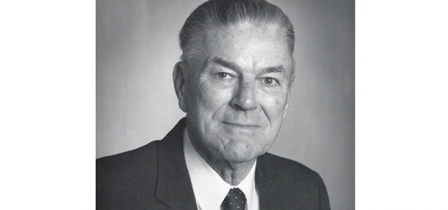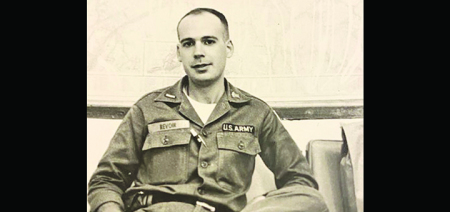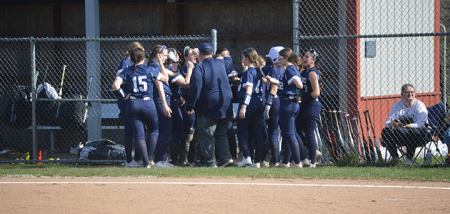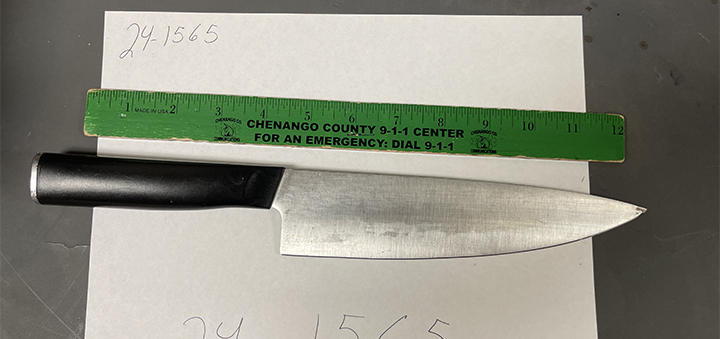NHS Sports Hall Of Fame Induction: Frank Giltner, Coach/Principal 1932-1965
Published:
July 28th, 2017

Jim Dunne
Contributor
Submitted Photo
NORWICH – Franklin E. Giltner came to Norwich in the fall of 1932, having graduated from Muhlenberg College that same year. He was recruited by his college buddy, Charlie Miers, who had come to Norwich a couple of years earlier.
Giltner’s first position was teacher of science in the junior high school. In 1935, he moved up to the high school as the teacher of chemistry and physics, and, more significantly for our present topic, as a coach in the athletic department under Kurt Beyer.
Over the next 30 years, Giltner coached wrestling (1935-1937, 1943-1945), football (1935-1936, 1942-1948, 1950-1953), and baseball (1933-1954). He was best known for baseball, where he was head coach for 22 years and compiled a record of 181 wins against 95 losses. He was the first NHS coach of wrestling, starting the sport that he knew nothing about, and in football he was the assistant coach who was never present on game day because he was off scouting the next week’s opponent.
Frank Giltner grew up in Tamaqua, Pennsylvania, next to the youngest in a family of five boys and four girls. His father was an engineer on the Reading Railroad, and Frank was the only one of the nine to go to college. He chose a scholarship to Muhlenberg over a professional baseball contract with the Cleveland Indians. All the boys were great athletes, and three of Frank’s brothers played football professionally for a team called the Pottsville Maroons, coached by former Colgate assistant Dick Rausch, and a member of the National Football League in the 1920s. When the Maroons played the Chicago Bears in 1925, Bears’ star Red Grange was said to have walked off the field after being knocked unconscious twice, saying, “The hell with the $500 – it ain’t worth it.”
At Muhlenberg, Frank also became famous as an athlete, earning three varsity letters in football and baseball. He was elected captain of the baseball team in both his junior and senior years, and was president of his senior class. One of the accomplishments in Norwich that he was most proud of was directing 48 NHS boys to Muhlenberg – and they all reported that, at the Allentown school, the name of Frank Giltner was legendary.
In 1935, Norwich formally instituted wrestling as a varsity sport. Frank’s son, Phil, tells the story that Athletic Director Kurt Beyer walked into Giltner’s classroom, handed him an instruction manual on how to coach wrestling, and told him to start a wrestling program. Thus began the strong and decorated history of wrestling in Norwich. In that first season, the opponents were Ogdensburg, Little Falls, Van Hornsville, and Oneonta, and then the State tournament at St. Lawrence University, at which Don Burns became Norwich’s first State champion, at 135 pounds.
Evident from the locations of the matches is the lengths, literally, that Giltner went to in seeking out opponents. Another story from Phil is that his father took Toots Mirabito to Syracuse to participate in a boxing competition (which Toots won), and then told him that he was also entered in the wrestling meet. Toots demurred, saying that he had never wrestled before. Giltner explained, “That’s okay, just hold the other fella’s shoulders to the mat.” And Toots proceeded to do exactly that, and won the class.
In 1936, in spite of a 2-6 dual meet record, the trip to the State Tournament at St. Lawrence produced two champions, Jack Lee at 155 and Toots Mirabito at 165. Warren Eaton finished second at 95, and Ang Zieno lost in the finals by a referee’s decision. Giltner was the wrestling coach from 1935 to 1937, and again from 1943 to 1946, when he handed off to Sam Elia after Sam returned from The War. He said that Don Burns and Dan McCarey were two of the best wrestlers he coached.
In 1937, Frank was asked to take on the collateral duty of vice-principal of the high school, while continuing to teach chemistry and physics. He had also become baseball coach in 1933 and assistant football coach in 1935. The demands on his time caused him to surrender the wrestling and football jobs, while continuing with baseball. On Sundays, he played with the famous semi-pro “Texacos.”
Frank’s favorite sport was always baseball. His record of 181-95 over 22 years does not reveal the extent to which he was a student of the game or the paternal influence he had on his players.
The list of captains during those years contains some illustrious sports names: Ang Mirabito, Tom Natoli, Ang Zieno, Tom Mirabito, “Bunky” Morris, Ed Dixon, Bob Gifford, Fred Johnson, John Whaley, “Soddy” Mirabito, Ed Ubbens, Bob Powers, Gerry Davis, Don McGraw and “Mouse” Purdy, John Maiurano, Dick Tyler, Don Case, “Monk” Simmons, John Loscavio, “Deac” Haynes, Barry Simmons, Howie Ryan and Tom Swales. There were only three seasons when losses outnumbered wins.
There were seven teams with 10 or more wins. Not surprisingly, the halcyon years of 1936 and 1937 produced records of 10-1 and 9-2. In 1941, 1942, and 1943, the opening games were no-hit, no-run wins for Norwich – the first by Ed Ubbens, the other two by Bob “Percy” Crittenden. Finally, in his last three years of coaching, 1952, 1953, and 1954, Norwich’s records were 11-1, 12-1, and 12-2.
It was a surprise to find that Giltner was not the assistant varsity football coach during all the same years as he coached baseball. He filled that position in 1935-1936, 1942-1948, and 1950-1953. During the ‘40s and early ‘50s, he was the perfect complement to Beyer during the week, supervising half the squad during drills, and then directing the play of the second team during scrimmage, simulating the formations and plays of that week’s upcoming opponent. He was able to do that because on almost every weekend, he was not with the team but rather out-of-town, scouting the team that Norwich would face next. The intelligence he obtained in that role was an important part of Norwich’s preparation, and Beyer recognized it: in an article for the Football Program in 1954, he reported, “Recent changes in the organization of the Norwich schools have included the elevating of Frank to a full-time administrative post as vice-principal. While this is a well-deserved promotion, it costs the athletic department one of its most valued coaches. His high school and college athletic careers prepared him well for football coaching and his natural aptitude for sports stood him in good stead as a Purple football coach. His scouting of opponents was always masterful and his knowledge of future opponents often provided Norwich elevens with enough savvy to deal with them successfully. During the years Norwich competed as an independent baseball team, league recognition was impossible, but since the formation of the Iroquois League, Norwich has won the League title in both years.” So, in the year that fire-ball pitchers Charlie Townsend and Fred Swertfager became senior co-captains, Frank turned over the coaching reins to Ray Borowicz.
After one year as vice-principal, Frank succeeded Russ Hogue as principal of the High School, a position he held for the next 10 years, until his retirement in 1965. He was universally respected among students, athletes, parents, and townspeople, although he shared with his family the regret that he could not continue to teach and coach. He passed on his love of baseball to his sons, Dave and Phil, and they became stars for Norwich, graduating in 1957 and 1961.
From the late 1930s until the 1960s, Giltner supplemented his modest salary by officiating football, basketball, and wrestling. He was best-known for his work on the mats, and was regarded as the best referee in central NY college wrestling. He worked matches at Cornell, Colgate, Syracuse, Ithaca, and Hartwick. Phil remembers traveling with his father to these colleges, and watching him work the matches.
Phil says that Frank’s trademark as a referee was the way he slapped the mat to signal a pin, “There was no doubt about it when he called a fall.”
Jim Howard, Ithaca College great and legendary college wrestling coach, said this about Frank, “He was a great official who officiated the most important college matches in the area at the time. He was well-respected and would freely give suggestions to all wrestlers to help them become better.”
Following retirement, Frank worked in the real estate business for 10 years, but stayed active in local sports, directing the Norwich summer baseball program for many years. He served as president of the Norwich Rotary Club, as head of the local Salvation Army, and as chairman of the Norwich Elks Charity Committee. Dignified in appearance and manner, he commanded respect and maximum effort from his athletes, but made sure they knew that he cared about them. He passed away in 1994 at the age of 84.
Comments





(1).jpg)

